#tulann
Photo
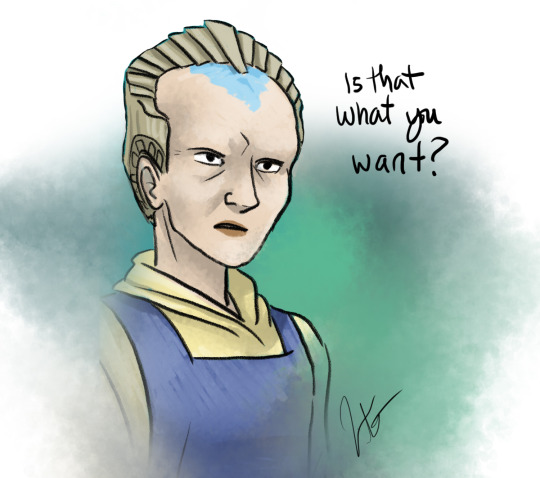
I posted a new page to Bablyon6 at 0am last night so I took a moment this morning to make a little eyecatch and let you all know there’s a new page up, and talk a little but about Tulann!
Tulann is of the Worker Caste. She’s been a model servant her entire life, doing everything that was required of her with exacting precision. Her specialization was engineering and problem solving, which helped her rise in ranks until she became a department manager and spontaneously a politician when Delenn broke the Grey Council.
As a person, Tulann believes in a thing done properly. She’s inflexible while following instructions, but also the first to throw them out the minute she realizes that they aren’t working. Every problem has a solution and if the one provided is insufficient she will make one.
In terms of her appearance in the fancomic, I generally don’t like to invent new characters when Babylon 5 already has such a robust cast of different characters -- be they fringe cast or one-episode appearances -- that I should never want for candidates. Unfortunately this isn’t true of the Worker Caste aside from the five named to the Grey Council, and I knew I wanted Delenn’s replacement in the ISA to be a Worker so Tulann lives! I hope she fits in well.
13 notes
·
View notes
Text

Previous | Table of Contents | Next
#babylon 5#babylon 5 spoilers#babylon 6#babylon 6 fancomic#fancomic#ep4#episode 4#art#jenstoart#She can't believe she's formed a family of Tulanns
41 notes
·
View notes
Photo

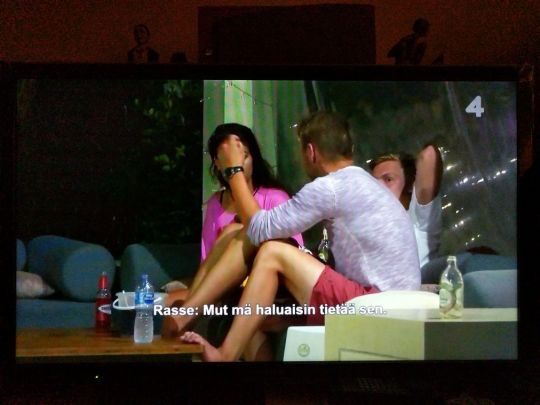
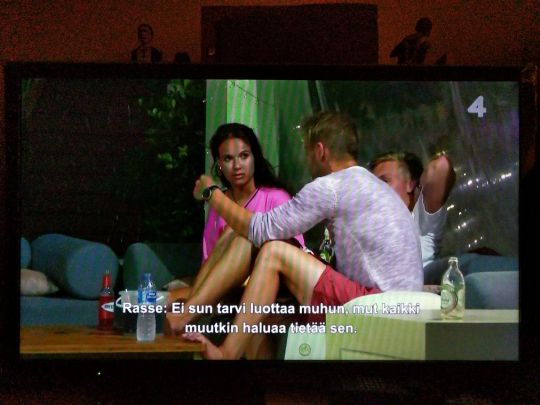

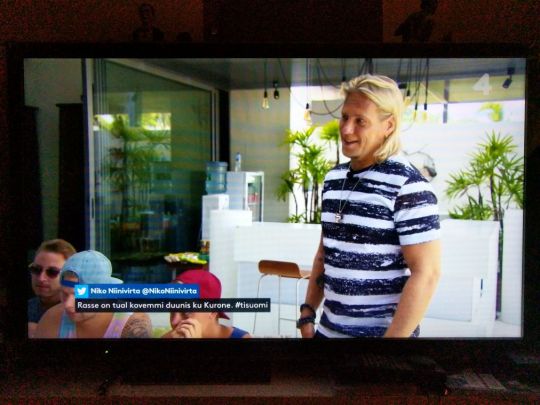
Jakso 12
Rasse: Mikä on homman nimi? Sul on äijä venaamas tuolla noin.
Rasse: Mut mä haluaisin tietää sen.
Rasse: Ei sun tarvi luottaa muhun, mut kaikki muutkin haluaa tietää sen.
Rasse: Nii, nii mikä on tulanne, miks te ootte aina vaan kolmisteen tai kahestaan?
Sekä
Niko Niinivirta @NikoNiinivirta
Rasse on tual kovemmi duunis ku Kurone. #tisuomi
#tisuomi#tissitwiitit#screenshot#ylipitkä#synkkä yksinpuhelu#kuulustelu#tekstitykset#Rasse#Josku#kurone#luottamus#tositelevisioammattilainen
0 notes
Text
José Varela Zequeira, ¿un poeta menor del Príncipe? (por Carlos A. Peón-Casas) Consultando hace poco una bien enterada Antología Poética de principios del siglo XX, intitulada Arpas Cubanas, referimos a los no pocos poetas allí incluidos, oriundos del terruño camaguayenensis, nacidos con toda propiedad en el Puerto Príncipe decimonónico(1). Entre los nombres incluidos nos llamó la atención el de José Varela Zequeira, porque según nuestro saber, los apellidos del que nos motiva esta cercanía, eran bastante comunes en la otrora ciudad de entre ríos. Pero ante la no evidencia de su real origen en la ya citada antología, no lo incluimos primariamente con los vates locales citados, sino que nos dimos a la tarea de rastrearlo en el no menos reconocido Diccionario Biográfico Cubano de Francisco Calcagno, en el que es posible ubicar a cualquier celebrado personaje del período colonial cubano hasta 1878, fecha en que viera la luz este enjundioso tratado bio-bibliográfico, verdadera rara avis de la cultura de su época. Y para nuestra satisfacción, saltó la liebre de entre sus páginas, y localizamos una primera, aunque incompleta referencia, a nuestro retratado. Se trata de una cita sobre el poeta pronunciada con autoridad por nuestro Enrique Josu Varona. Allí leemos que: Varela (José Zequeira)- Pto. Príncipe. Poeta contemporáneo, “Varela ha ensayado recientemente y con éxito feliz un género a que lo está llamando su temperamento poético, la poesía política: su epístola La Indolencia esta escrita con esa ironía, verdaderamente socrática que lleva a la perfección en el género. Por lo demás, fuera de estas cualidades intrínsecas, Varela posee la facultad imaginativa en grado eminente y su dicción es siempre bellamente figurada, y por extremo armónicas sus rimas, es verdaderamente un notable improvisador’’ (Varona, La Nueva Era, 1878) (…)(2) Y aunque como el lector se percata, la nota biográfica, no hace referencia a la fecha y lugar exacto de de su nacimiento, hemos podido saber empero, gracias a la búsqueda en Internet, que para aquel minuto de 1878, el joven poeta Varela, a quien Varona alude en su crítica, era su amigo personal, y tenía en ese momento, veinticuatro años cumplidos. Había nacido el 19 de marzo de 1854 en la otrora ciudad de San Fernando de Nuevitas perteneciente a la jurisdicción de Santa María del Puerto del Príncipe. Primer vástago del matrimonio de José Varela Recaman, y Faustina Zequeira y Agüero. Con solo seis años había viajado con su familia a Santiago de Compostela, de regreso a Puerto Príncipe en 1870, el joven José, con solo dieciséis años, inició una amistad para toda la vida con el ya citado Enrique José Varona y con Esteban de Jesús Borrero y Echevarría, para entonces ambos, con destacada obra literaria(3). Ya en el libro antológico que reseñamos primero, Arpas Cubanas, que vio la luz en 1904, se dice de Varela Zequeira, por parte de su prologuista el afamado hombre de letras Conde Kostia (Aniceto Valdivia), que en una de sus composiciones allí reunidas: “revela al gran bardo que lucha por ahogar-ah sin conseguirlo-al médico”(4). Tal revelación, nos confirma lo que sigue citando la profusa información biográfica ya citada, compilada por su nieta Beatriz Varela(5), y donada a los fondos históricos de la Universidad de Miami, que Varela se recibió de medico en la Universidad de La Habana en 1887, y completó su doctorado en 1900. Para 1904 el poeta Varela, ya con una obra reputada, compartía su vocación poética con su labor médica como director de La Benéfica, una bien conocida clínica habanera desde 1898(6). Nuestra cercanía, alude ahora a los textos poéticos que se recogen en la ya citada Arpas Cubanas, unos seis en total. Y en los que podemos descubrir las ya mentadas cualidades a que Varona nos aludiera en la cita precedente. Se recogen allí, en sucesión, los poemas: Nuevos Ideales (1876), Bajo los Cipreses (1897), Mi Virgen (1897), Lira Oculta (1897), Anhelo Infinito (1880) y Esperar es Vivir(1880). De todos los citados, el último tiene el especial aplauso del Conde Kostia, el prologuista de la colección de poetas ya mentado. El poema, tiene la estructura estrófica de una cuarteta con versos endecasílabos (primero y tercero con rima consonante), y versos octosílabos (segundo y cuarto igualmente con rima consonante). Del mismo hacemos una cita de algunos fragmentos para que el lector pueda hacerse una más clara idea de las cualidades poéticas de este rimador. Si todo generoso sentimiento Deja una huella impura, Y el pan de caridad es un fermento De amarga levadura, Si no hay un seno fiel, no profanado, Do reposar en calma, Y no existe un hogar alimentado Con la lumbre del alma Si toda hierba vil germina y cunde En la humana existencia, Y no hay un torpe error que no circunde De sombras la conciencia, (…) Y el hombre encadenado a su impotencia, En eterno martirio, Solo anima con fuego de la ciencia Engendros del delirio Entonces para que la férrea lanza Y la enseña irrisoria? ¿Para que combatir sin la esperanza De alcanzar la victoria? (…) Si con la fresca miel de los amores El corazón vacío Se llena como el cáliz de las flores Con gotas de rocío, Nuestra ofrenda de lágrimas llevemos Al ara de la vida, Templados al dolor, mereceremos La herencia bendecida Ella será la luz de nuestros lares, La tienda en el desierto, La estrella en la borrasca de los mares Y el ancora en el puerto. 1880. Con Varela Zequeira, el poeta-médico de nuestro inmemorial Príncipe, no creo parece cumplirse ese fatal exordio borgiano que aludiendo a uno de esos poetas olvidados, postula en verso fatal: “La meta es el olvido, yo he llegado antes”. Del rimador principeño y sus versos, ciertamente inspirados queda un halito vital que lo salva para la posteridad, aunque su nombre, como el de tantos mal entendidos “poetas menores”, parezca diluido por tanto tiempo, al menos entre los camagüeyanos de este hic et nunc. Recuperar su memoria, tan injustamente descolocada y que duerme, inmerecidamente, el sueño del olvido, en el marasmo tan sutil de la desmemoria siempre avasalladora, es ciertamente un anhelo demandante. Sin dudas, José Varela Zequeira, poeta singular de aquel Príncipe siempre legendario, merece se le haga justicia y su voz emotivamente poética, a la mejor altura de los bardos de su generación, perdure un poco mas. Véase: Poetas del Camagüey (por Carlos. A. Peón-Casas) Diccionario Biográfico Cubano. Francisco Calcagno. New York Imprenta y Librería de N. Ponce de León. 40 y 42 Broadway, 1878. pp 602-603 José Varela Zequeira Papers, Cuban Heritage Collection. University of Miami Libraries. Coral Gables, Florida. (Gift of Beatriz Varela, 2000) En Varela Zequeira, Jose (1854-1939) University of Miami. Note Author: Pedro A Figueredo, 2001 Arpas Cubanas. Poetas Contemporáneos. Prologo del Conde Kostia. La Habana.Imprenta de Rambla y Souza. MCMIV. Nació en La Habana. Graduada en la Universidad de La Habana y en la de Tulanne University en New Orleans, Louisiana. Autora de varios libros artículos incluyendo uno sobre la vida y obra de su abuelo: José Varela Zequeira (1854-1939) su obra científico literaria en 1997. En Jose Varela Zequeira Papers… Op.cit. Desde 1891 a 1894, fungió como secretario de la Real Sociedad Económica de Amigos del País. Desde 1890 conspiró a favor de la independencia de Cuba y ante la amenaza de ser detenido partió a Nueva York en 1897. Ibid. http://www.ellugareno.com/2018/03/jose-varela-zequeira-un-poeta-menor-del_21.html?utm_source=feedburner&utm_medium=email&utm_campaign=Feed%3A+GasparElLugareo+%28Gaspar%2C+El+Lugareño%29
por Carlos A. Peón-Casas
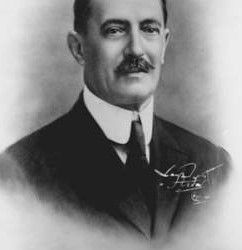
Consultando hace poco una bien enterada Antología Poética de principios del siglo XX, intitulada Arpas Cubanas, referimos a los no pocos poetas allí incluidos, oriundos del terruño camaguayenensis, nacidos con toda propiedad en el Puerto Príncipe decimonónico(1).
Entre los nombres incluidos nos llamó la atención el de José Varela Zequeira, porque según nuestro saber,…
View On WordPress
0 notes
Note
Hi, my name is Tulann, and I'd really like to speak with Gil Galad. I have been out as non-binary for over a year now, and people are still really bad at using my pronouns. I've tried handing out little cards to help them remember, but they're still not getting it, and they say they're trying but using the wrong pronouns five minutes after I've given them the card. I want to be able to tell people it's not okay, but I'm really scared to. (Tulann, 1/2)
Whenever I reminded my mum, she got really angry with me, and it always led to an argument, so it’s got kind of ingrained that that’s what’ll happen. Do you have any advice for being more confident and assertive, especially -about things that are important?
---------------------------------------
Greetings, Tulann,
In my experience, this is something that requires practice. Rather like playing a musical instrument or playing a sport requires practice to get easier and more comfortable, so does standing up for one's self and becoming more confident.
I think it would help you to remember two things:
- Not everyone is your mother. Just because she gets angry and argues does not mean that everyone will.
- You have the right to expect basic respect from people. If someone tries to argue with you about your pronouns, THEY are in the wrong, not you.
Your cards are an excellent idea. It really is too bad they do not seem to work for everyone. But since they are not, your only options are to either accept the misgendering or to actually speak up, which as I said will only become easier with practice. Since the first option is not a true option, I would suggest a few specific practices you can try:
- The first time someone misgenders you, allow them to finish what they were saying, and then gently remind them about your proper pronouns. "Just a friendly reminder but the appropriate pronoun for me is [pronoun that you use], not [pronoun that you do not use]"
- If they continue misgendering you, the time has come to be more firm. "Excuse me but like I have already said, my pronoun is [pronoun]. I would very much appreciate it if you would use it like I have asked."
- If they continue to misgender you even after that, do not be afraid to call them on their behavior. It is rude. They need to know that, and to know that you know that. "I find it quite rude that you refuse to use my proper pronoun. Once again, my pronoun is [pronoun]."
- If someone continues misgendering you even after all of this, I think it is safe to assume that they have no interest in being polite to you, in which case you have a difficult choice ahead of you. If you can remove yourself from the conversation, I think you would be within your rights to do so. If you cannot, it might be worthwhile to seek someone's help in resolving the situation. For example, at a job you could speak to someone in human resources. If you are in school and the person doing this is a teacher or professor, you could enlist the aid of another teacher/professor, a school counselor, the dean of students, your adviser, or anyone else who might be able to help (it might be worthwhile to see if your school has an appropriate club or support group that might be able to offer you advice on resolving this issue).
I would suggest being gentle and patient with people at first. Many people are unfamiliar with the idea that there are more than two genders or that someone might not fit into one of those two genders, and the concept of using pronouns that (in their opinion) do not "fit" their expectations can be difficult for them. In addition, if your pronouns are very unusual (e.g. outside of the usual he/she/they spectrum) people might not understand them or might not know how to pronounce them. In a case like this, handing over your card with a gentle mention of how to say the words could be enough to resolve the situation. That said, I think it is reasonable to expect that people who truly respect you will take some responsibility for their own difficulties and it will be clear that they are making a genuine effort, even if the results of their efforts are not immediately perfect (e.g. someone who is clearly trying to use your preferred pronouns but is struggling with pronunciation). Of course none of this means that you have to let people walk all over you, or that you should let them. All it means is that they should be given a chance. You will be able to tell very quickly if they are being rude, and thus if you need to move on to being firm with them about your completely reasonable expectations for how they will treat you, or if they are simply struggling with getting it right.
But most of all, be gentle with yourself. This sort of thing is a journey. You will find that sometimes being assertive is tiring, frightening, or otherwise difficult and that it is easier to just go with what is happening than to fight. And that is perfectly alright. We all have days that are a struggle, and days when we have to make the difficult decision to retreat and save our strength to fight another day instead of fighting right now. As you practice, these days will become more and more rare and you will find that it is much easier and less stressful to demand the treatment you deserve.
I hope you have found this helpful, mellon. Never give up. Your fight is just and worthwhile.
Best,
Gil-Galad
4 notes
·
View notes
Photo
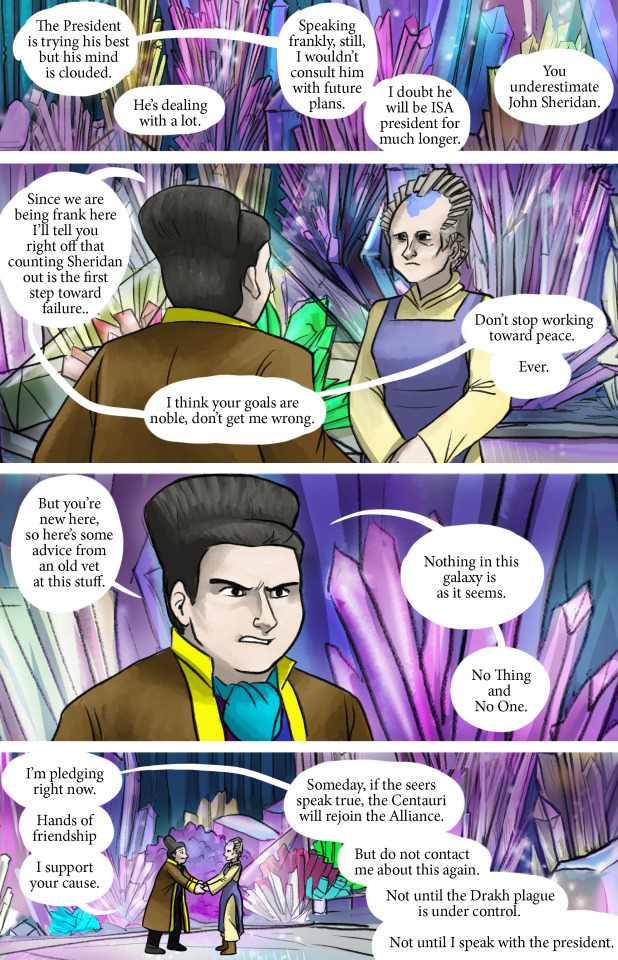
Previous | Table of Contents | Next
#babylon 5#babylon 5 spoilers#babylon 6#babylon 6 comic#episode 4#art#jenstoart#tulann suffers from fifteen minute late with starbucks syndrome
26 notes
·
View notes
Photo
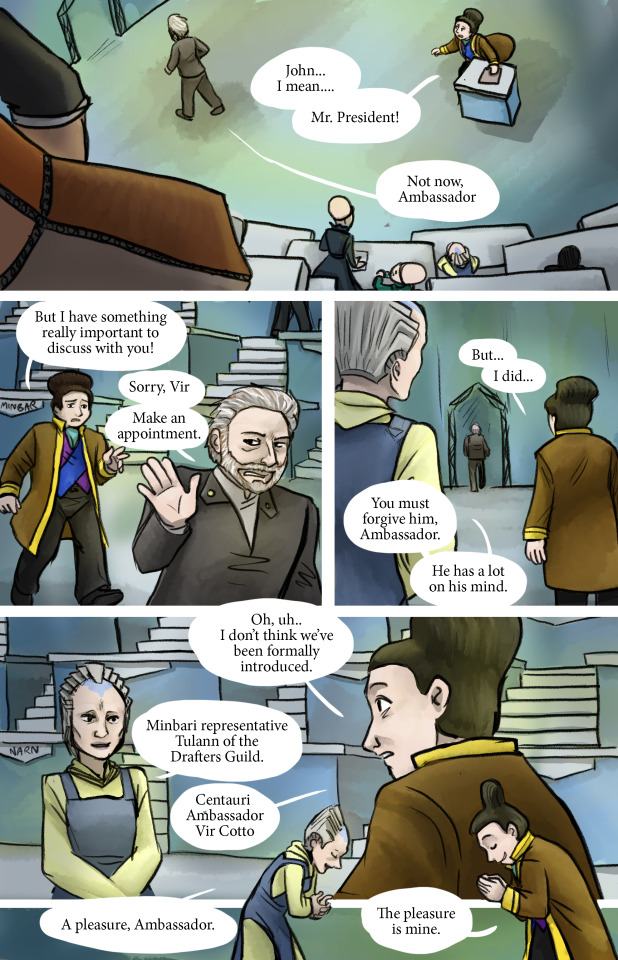
Previous | Table of Contents | Next
#babylon 5#babylon 5 spoilers#babylon 6#babylon6comic#episode 4#art#jenstoart#For those who don't remember way back to the beginning of this episode#tulann is Delenn's replacement as ISA Rep
29 notes
·
View notes
Photo
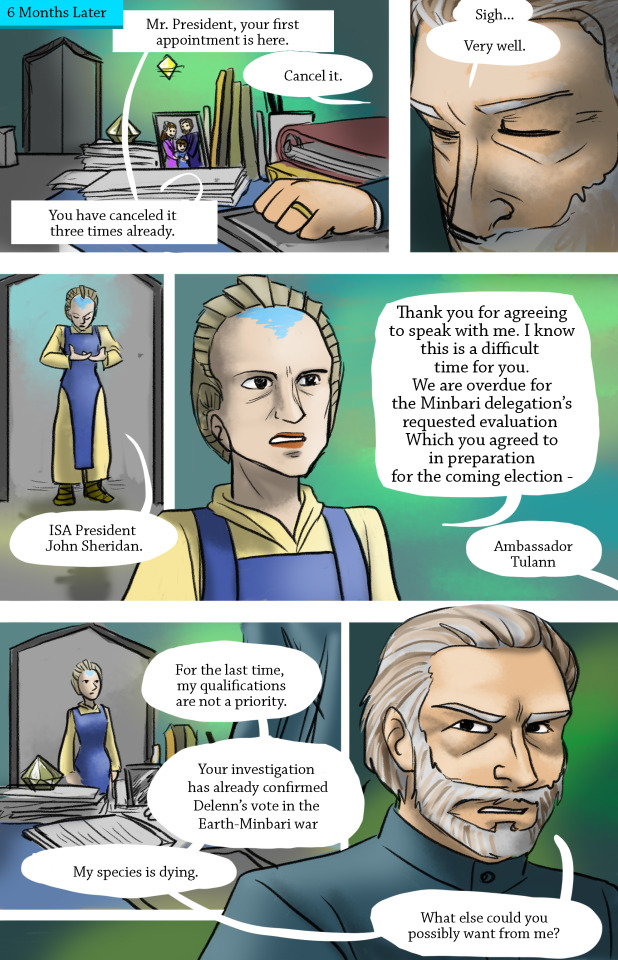
Previous | Table of Contents | Next
#Babylon 5#babylon 5 spoilers#babylon 6#everyone meet Tulann#i've had her in the wings for literal years and she's finally introduced#I do my best not to invent characters where established ones can fit the mold#but I really wanted the new representative to be from the worker caste and we don't have any of those with names yet#comic#fancomi#art#jenstoart#episode 4
27 notes
·
View notes
Photo
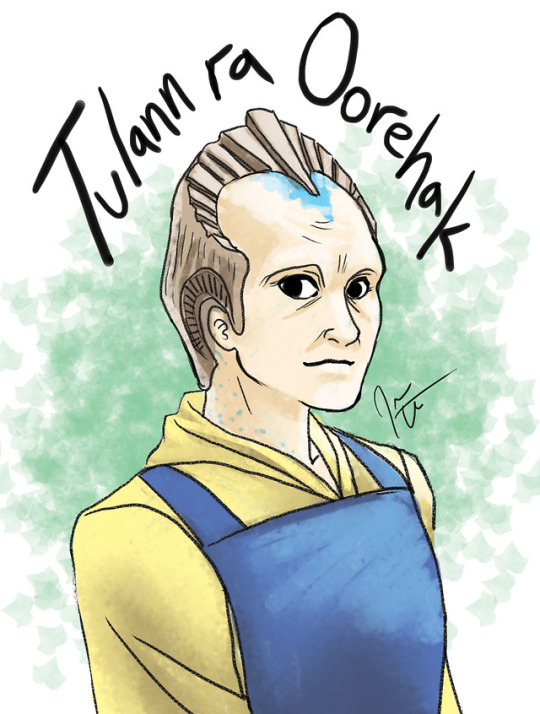
Everyone please meet my new OC. She’s a worker caste leader named Tulann who will be appearing in the fourth chapter of @babylon6comic you know, after I finally get chapter 3 done >< Wanted to post something related to the comic so you all knew it wasn’t dead, just on hiatus while I get life stuff done. K thanks.
Tulann is a city planner on Minbar and the head of her particular guild. When the grey council need to send a diplomat to the ISA to speak on their behalf, they choose Tulann. She, herself, is unsure about her suitability on this position but she loves her team and they believe in her, and when the workers are chosen for such important work you do not turn it down. Tulann has a hard time finding confidence at first, especially with the foreign diplomats, but her cause is great and she refuses to diminish.
#babylon 5#babylon 5 oc#tulann ra oorehak#thanks traveler19 for help with her name!#babylon 6#babylon6comic
18 notes
·
View notes